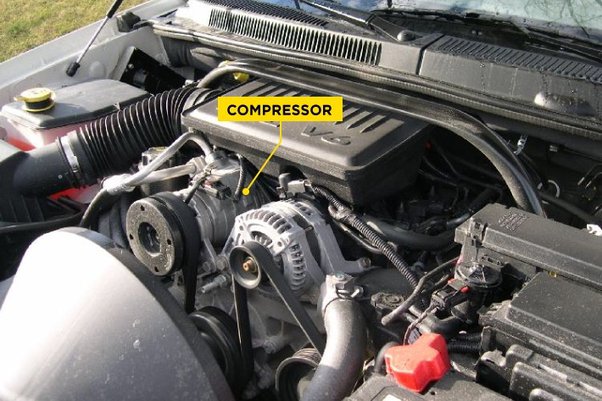Understanding the Role of the Automotive AC Compressor: How It Keeps You Cool

During the hot summer months, the air conditioning (AC) system in your car plays a crucial role in maintaining a comfortable driving experience. While we often overlook it, the AC system consists of several interconnected components working together to cool the cabin. One of the most important parts of this system is the automotive air conditioning compressor. This component pressurizes the refrigerant and ensures it circulates properly, helping to remove heat from the cabin. Understanding the function of the compressor and its importance can help you take better care of your vehicle’s cooling system, ensuring it operates efficiently when you need it most.
What Is an Automotive AC Compressor?
The AC compressor is often referred to as the “heart” of the air conditioning system. It is a mechanical device responsible for circulating and compressing refrigerant throughout the AC system. The compressor is powered by the engine via a belt, which drives it as the engine runs. Its main role is to take in low-pressure, gaseous refrigerant from the evaporator (which absorbs heat from the cabin air) and compress it into a high-pressure, high-temperature gas.
Once the refrigerant is compressed, it is sent to the condenser, where it cools down and turns into a liquid, continuing the cycle of heat exchange that keeps your car’s cabin cool.
See also: How to Automate Smart Ceiling Fans with Heating and Cooling Systems
How the AC Compressor Works
To understand how the AC compressor works, let’s break down the process:
- Suction of Refrigerant: The compressor draws in the refrigerant vapor from the low-pressure side of the system (from the evaporator). This refrigerant is cool, low-pressure gas after absorbing heat from the vehicle’s interior.
- Compression: Once the compressor draws in the refrigerant, it uses a piston or rotor to compress the gas, which increases both its pressure and temperature. This compression process is vital because it enables the refrigerant to release heat when it reaches the condenser.
- Discharge to the Condenser: The high-pressure, high-temperature gas is then pushed out of the compressor and travels to the condenser. The condenser’s job is to release the heat from the refrigerant, causing it to condense into a liquid form.
- Cycle Continuation: After the refrigerant has cooled and condensed, it is sent to the expansion valve (or orifice tube) to reduce its pressure and temperature before entering the evaporator, where the cycle starts over again.
This continuous cycle of compressing, cooling, and expanding refrigerant allows the AC system to remove heat from the cabin and replace it with cool, dry air. Without a functioning compressor, the entire system would fail to work as intended, leaving your car without cooling capabilities.
Why Is the AC Compressor So Important?
The compressor is essential because it is the component that initiates the refrigerant cycle. Without it, there would be no way to circulate refrigerant and regulate the temperature inside the vehicle. Here’s why the compressor is so important for your car’s AC system:
- Temperature Control: The compressor ensures that the refrigerant circulates through the system to absorb and release heat, effectively controlling the temperature inside the cabin. A malfunctioning compressor will result in weak or no cooling at all.
- Efficient System Operation: The compressor helps maintain a consistent and efficient cooling process. It works in conjunction with other components, such as the condenser, evaporator, and expansion valve, to regulate pressure and temperature, ensuring the system operates efficiently.
- Reliability: As the heart of the system, the compressor ensures reliable operation of the entire AC unit. Without a properly functioning compressor, your car’s AC system won’t be able to cool the cabin efficiently, leaving you uncomfortable during hot weather.
Signs of a Failing AC Compressor
Like any mechanical component, the AC compressor can wear out over time. When it fails, it can have a significant impact on the performance of the AC system. Here are some signs that your AC compressor might be failing:
- No Cool Air: One of the most obvious signs of a failing compressor is the lack of cool air coming from the AC vents. If the compressor is not circulating refrigerant properly, the system will fail to cool the air inside the cabin.
- Strange Noises: If you hear grinding, squealing, or clattering noises coming from the AC system, it could be a sign that the compressor’s internal components are wearing out. These sounds indicate that the compressor is struggling to function and may need to be replaced.
- Hot Air Blowing from Vents: If you notice that the air coming out of the vents is warm or lukewarm instead of cold, it could mean that the compressor is not pressurizing the refrigerant correctly, leading to inadequate cooling.
- AC Clutch Issues: The AC compressor has a clutch that engages and disengages based on the system’s needs. If the clutch is malfunctioning, it could result in the compressor failing to operate properly, causing issues with cooling.
- Refrigerant Leaks: A leaking compressor can lead to a loss of refrigerant, which in turn results in decreased cooling efficiency. If you notice refrigerant leaks around the compressor or hoses, it could be a sign that the compressor is failing.
- Electrical Issues: Some compressors may have electrical issues that cause the system to fail. This can include issues with the wiring, fuses, or the compressor’s internal electrical components.
What Happens When the AC Compressor Fails?
If the AC compressor fails, it can lead to a number of issues that affect the overall cooling performance of your car. Here’s how a failed compressor impacts the system:
- Complete Loss of Cooling: Without a functioning compressor, refrigerant can no longer circulate, resulting in a complete loss of cooling capacity.
- Strain on Other Components: A failing compressor can put additional strain on other components of the AC system, such as the condenser and evaporator. This can lead to more extensive damage and higher repair costs.
- Potential Engine Strain: The AC compressor is powered by the engine, so a malfunctioning compressor can cause the engine to work harder, potentially leading to decreased fuel efficiency or engine overheating.
Conclusion
The automotive AC compressor is a crucial component of your car’s cooling system, ensuring that the refrigerant circulates effectively to cool the cabin. It works tirelessly to compress, circulate, and regulate the refrigerant, maintaining the desired temperature inside the vehicle. A malfunctioning or failed compressor can result in poor cooling performance, engine strain, and costly repairs. Recognizing the signs of compressor failure early and addressing them promptly can help extend the life of your AC system and ensure your comfort on the road, even during the hottest months of the year. Regular maintenance and timely repairs can keep your car’s AC compressor in top shape, ensuring optimal performance and a cool, comfortable ride.





